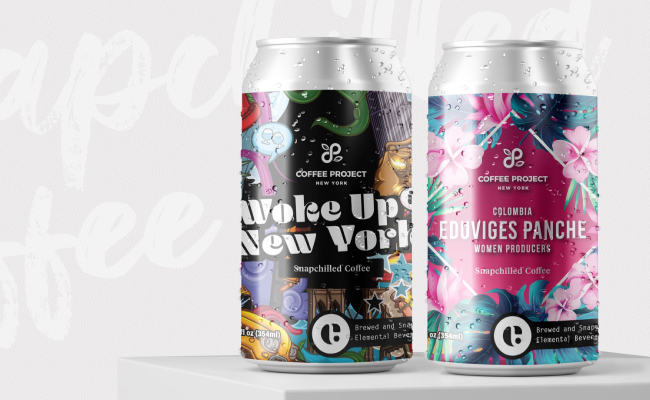Coffee Project NY has been innovating on-premise in their New York City cafes for years, with items ranging from limited-batch single-origin roasts to deconstructed lattes. But it took a global pandemic to push co-founders Chi Sum Ngai and Kaleena Teoh to develop a coffee they could share with consumers beyond the city limits.
As the pandemic lockdown took effect last March, Ngai said customers began ordering multiple iced coffees – without the ice – explaining it as an attempt to maintain social distancing protocols with their favorite brew in hand, at least for a few days at a time. Ngai said that close relationship with their regulars sparked the interest to develop a ready-to-drink, shelf-stable coffee offering.
First, the cafe began selling half gallons of its cold brew and iced latte to accommodate the new demand; as restrictions eased up, however, the co-founders believed the appeal for their shelf-stable offering remained. After a lengthy research and development process, Coffee Project NY has launched two RTD coffees available for $23 per four-pack in any of its four NYC cafes and on its ecommerce platform.
The company’s offering was developed with Elemental Beverage Co., a company that uses a “Snapchill” process – cooling a beverage from 140ºF to 40ºF within one minute. Elemental brews, packages and ships Coffee Project’s RTD from its Massachusetts-based facility.
“Coffee retains most of the flavor profile when it’s brewed hot, so it doesn’t deviate a lot,” said Ngai. “The challenge of making cold coffee is we worry about oxidation and we worry about diluting it. But the Snapchill technology is good enough to make sure that we can retain as much quality and the taste from the coffee.”
Coffee Project roasts beans for its cafes and RTDs inside its Specialty Coffee Association (SCA) Certified Roastery and Training Campus located in Long Island City, New York. The roastery was a key player in the development of the RTD as it allowed Ngai, Teoh and their staff to easily tweak the roast in one of their three in-house roasters after receiving the prototypes from Elemental.
The RTD is available in a single-origin roast, Colombia Eduviges Panche, named for the Colombian coffee farmer who grew the beans. The packaging for this can features information about Panche and her farm. According to Ngai, months after purchasing Panche’s entire lot of coffee she received a video from the farmer explaining how the purchase enabled her to send her children to school that year. Ngai said they will continue purchasing from Panche and hope to expand the single-origin RTD line to support additional coffee farmers.
Although the single-origin roasts are a limited stock, “Woke Up in New York,” the cafe’s flagship house blend, will be a permanent resident of the RTD line, according to Ngai. This was the first roast to receive the team’s approval to be packaged and produced as an RTD and is the most popular coffee across all of their cafes.
“It is pretty much the one coffee that we are all super proud of – it’s very easy to drink and it is also very nice to use as the base for a cocktail,” said Ngai. “If you wanted to make a cocktail with some nuttiness, some chocolate notes in it you can actually open up a can as the base and add your gin and tonic in there as well.”
Coffee cocktails are likely to be the next experiment in Coffee Project’s cafe, said Ngai. Her baristas have been interested in offering alcoholic beverages for a while and explains that enabling their curiosity is the reason Teoh and herself were able to grow their single East Village cafe to multiple locations with a dedicated following over the past six years.
Coffee Project has also partnered with Youth Options Unlimited (YOU), a Boston-based youth group, to help train young people and certify them as baristas so they can find jobs. Additionally, the company, in partnership with Chobani, has granted six scholarships to African American coffee professionals that includes a free two-day virtual Coffee Skills Program through Coffee Projects SCA-certified facility.
“Kaleena and I started Coffee Project all by ourselves,” said Ngai. “We didn’t have the resources to do a lot of things back then and we didn’t know anyone. Now we have the ability, the knowledge and also the network so we want to make it easier for people so they don’t struggle much like we did back then.”
